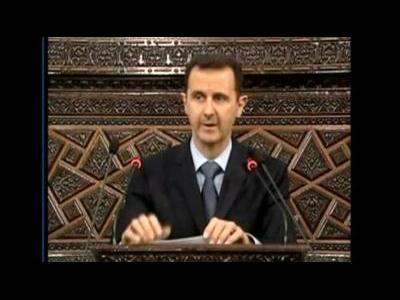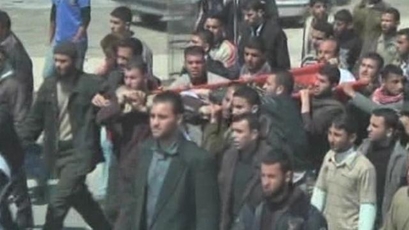 AP – A Syrian sits in his shop to watch Syrian President Bashar Assad make a televised address from Parliament, …
AP – A Syrian sits in his shop to watch Syrian President Bashar Assad make a televised address from Parliament, …DAMASCUS, Syria – Syria's president dashed expectations that he would announce sweeping reforms Wednesday and instead took a tough line, blaming two weeks of popular fury on a foreign conspiracy.
Bashar Assad's own officials billed his speech as an introduction of major change and the turnaround infuriated protesters who vowed to keep up with their extraordinary cries for reform.
The conflicting messages also raised questions about a possible rift in one of the Middle East's most rigid regimes, where Assad and a tight coterie of family and security services hold all the reins power.
"Syria is being subjected to a major conspiracy," Assad said in his first public comments since the turmoil began, touched off by the arrest of several teenagers who scrawled anti-government graffiti on a wall. Human rights groups say more than 60 people have been killed since March 18 as security forces cracked down on the demonstrations.
Assad made only a passing reference to the protesters' calls for change, saying he was in favor of reform, but acknowledged there have been delays. "The question is what reforms do we need," he said, without offering any specifics.
Radwan Ziadeh, a visiting scholar at the Institute for Middle East Studies at George Washington University, said Assad missed an opportunity to distinguish himself from other dictators in the region who refuse to bow to public demands.
"I think Assad opted not to announce the reform measures in his speech today because he doesn't want to be seen as having succumbed to street pressure," Ziadeh said. "The language he used shows how out of touch he is with his people."
Social networking sites immediately exploded with activists calling on Syrians to take to the streets.
Within hours of Assad's speech, residents of the Mediterranean port city of Latakia said troops opened fire during a protest by about 100 people, although it was not immediately clear whether they were firing in the air or at the protesters. The residents asked that their names not be published for fear of reprisals.
Latakia, which has a potentially volatile mix of different religious groups, already has become a flashpoint for violence that could take on a dangerous sectarian tone in the coming days and weeks.
The anti-government protests and ensuing violence have brought Syria's sectarian tensions into the open for the first time in decades, a taboo topic because Syria has a Sunni majority ruled by minority Alawites, a branch of Shiite Islam.
Assad has placed his fellow Alawites into most positions of power in Syria. But he also has used increased economic freedom and prosperity to win the allegiance of the prosperous Sunni Muslim merchant classes, while punishing dissenters with arrest, imprisonment and physical abuse.
Assad, who inherited power 11 years ago from his father, appears to be following the same strategy of other autocratic leaders who scrambled to put down uprisings by offering minor concessions coupled with brutal crackdowns. The formula failed in Tunisia and Egypt, where citizens accepted nothing less than the ouster of the regime.
Assad fired his 32-member Cabinet on Tuesday in a move designed to mollify the anti-government protesters, but the overture was largely symbolic. Assad holds the lion's share of power in the authoritarian regime, and there are no real opposition figures or alternatives to the current leadership.
Rime Allaf, a Syrian associate fellow at London's Chatham House, said it was clear from Assad's speech that he did not want to show any weakness.
"On the issue of reforms, his message was: 'We will not be pressured, we're doing it anyway and we will let you know when we're ready,'" she said.
When the unrest roiling the Middle East hit Syria, it was a dramatic turn for Assad, a British-trained eye doctor who said in January that his country was immune to such unrest because he is in tune with his people's needs.
Assad does maintain a level of popular support, in no small part because of his anti-Israel policies, which resonate with his countrymen. And unlike leaders in Egypt, Tunisia, Yemen and Jordan, Assad is not allied with the United States, so he has been spared the accusation that he caters to American demands.
State Department spokesman Mark Toner told reporters in Washington that Assad's speech "didn't really have much substance to it."
"We expect (the Syrian people) are going to be disappointed," he said "We feel the speech fell short with respects to the kinds of reforms that the Syrian people demanded, and what President Assad's own advisers suggested was coming."
Although Assad has clamped down on political freedoms, many credit him with modernizing Syria and opening up the economy. He also is seen as relatively vibrant, at age 45. He and his wife, Asma, who recently was featured in a glowing profile in Vogue magazine, are often spotted driving around town, even photographed in Damascus riding bicycles with their three young children.
So far, few in Syria have publicly called on Assad to step down. Most are calling for reforms, annulling emergency laws and other stringent security measures and an end to corruption.
But Syria has a history of brutally crushing dissent — including a notorious massacre in which Assad's late father, President Hafez Assad, crushed a Muslim fundamentalist uprising in the city of Hama in 1982, killing thousands.
The unrest in Syria, a strategically important country, could have implications well beyond its borders given its role as Iran's top Arab ally and as a front line state against Israel.
Philip Luther, Amnesty International's deputy director for the Middle East and North Africa, said pinning the blame on a foreign conspiracy is a snub to the many Syrians who are calling for reform.
"He should be addressing the real problem — which is that his security forces have been firing live ammunition on protesters," Luther said.
 Play Video Reuters – Syria maintains emergency law
Play Video Reuters – Syria maintains emergency law ___
AP writer Bassem Mroue contributed to this report from Beirut, Lebanon.
http://news.yahoo.com/s/ap/20110330/ap_on_re_mi_ea/ml_syria



No comments:
Post a Comment